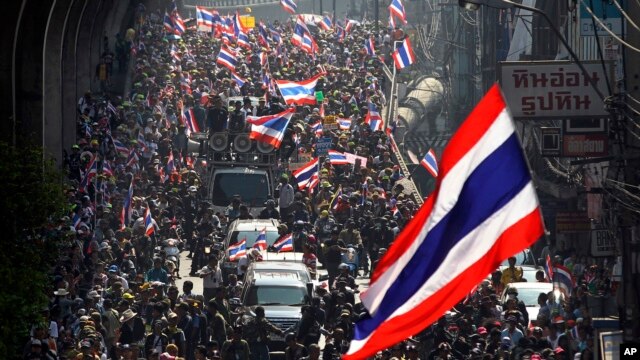
Anti-government protesters with national flags gather for a rally Thursday in Bangkok, Thailand, Jan. 30, 2014.
BANGKOK — Thailand's anti-government protesters are vowing to oust Prime Minister Yingluck Shinawatra and her family from politics even if Sunday’s elections reaffirm her popular support. As tensions mount, Thai experts say mediation is needed to prevent further violence.
But protesters say they will not be deterred by the government's decision to proceed with the polls, continuing to gather for concerts and marches. Waving a large Thai flag at one gathering outside Bangkok's Lumpini Park, Surachet Sinkreawan is resolute.
He says they will not lose, even though the government is going ahead with the election. But he says he is not sure whether any violence will occur such as happened on the advance voting day.
Protest leader Suthep Thaugsuban says they do not intend to block voters again, as they did Sunday, but aim to eliminate the Shinawatra family and its loyalists from politics.
The protesters, mainly middle and upper class, want to suspend the elections that their candidates in the Democrat Party keep losing and replace the government with a ruling council to usher in unspecified reforms.
But an overthrow of elected leaders could bring the government's Red Shirt supporters back to Bangkok and risk violent conflict.
More efforts are needed to negotiate a compromise, says Kriengsak Chareonwongsak, president of the Institute of Future Studies for Development in Thailand.
“You either negotiate before the violent clashes or you do it afterward," he said. "Somewhere, negotiation must happen. And, I think it will happen in Thailand. Unfortunately, my prediction now - [if] it is going this way without change-it will be after bloodshed.”
Academic and legal expert at Harvard Law School Verapat Pariyawong says the only likely mediator is the Thai military.
“So, if there's going to be someone who can conduct a principled mediation, which is in itself quite against the principle because I don't think the military is supposed to be conducting mediation between the government and protest leaders, but it has to be the military," he said. "And, I think the only legitimate way for that to happen is for there to be a strong turn-out on February 2nd so Thai people can send the message to the military commanders that they want this country to move forward.”
But political analysts worry an impatient military may overthrow the government, as it did to her divisive brother, Thaksin Shinawatra in 2006, and many other times in the past.
Or, pending lawsuits that have been quickly fast-tracked, that it could remove the prime minister and her party from power as was done to Thaksin's supporters.
Thailand's National Anti-Corruption Commission on Wednesday launched a probe of the government's controversial rice pledging subsidy scheme.
The Chart Thai party, now called Chartthaipattana, was dissolved as part of Thaksin's coalition and its leaders banned from politics for five years.
It is now aligned with the ruling Pheu Thai party and spokesman Nikorn Chamnong says if the courts go after their lawmakers it would only make things worse.
"But, this time if ban happen, the banning happen, it would happen (to) the member of parliament. It's more deep. Deeper than the party ban, believe me."
Regardless of how the voting is Sunday, a government will not be formed for some months as protesters blocked candidates from registering and a boycott by the Democrat Party means by-elections will still be needed.
That leaves Thailand's immediate future in a dangerous power vacuum.
|
|
